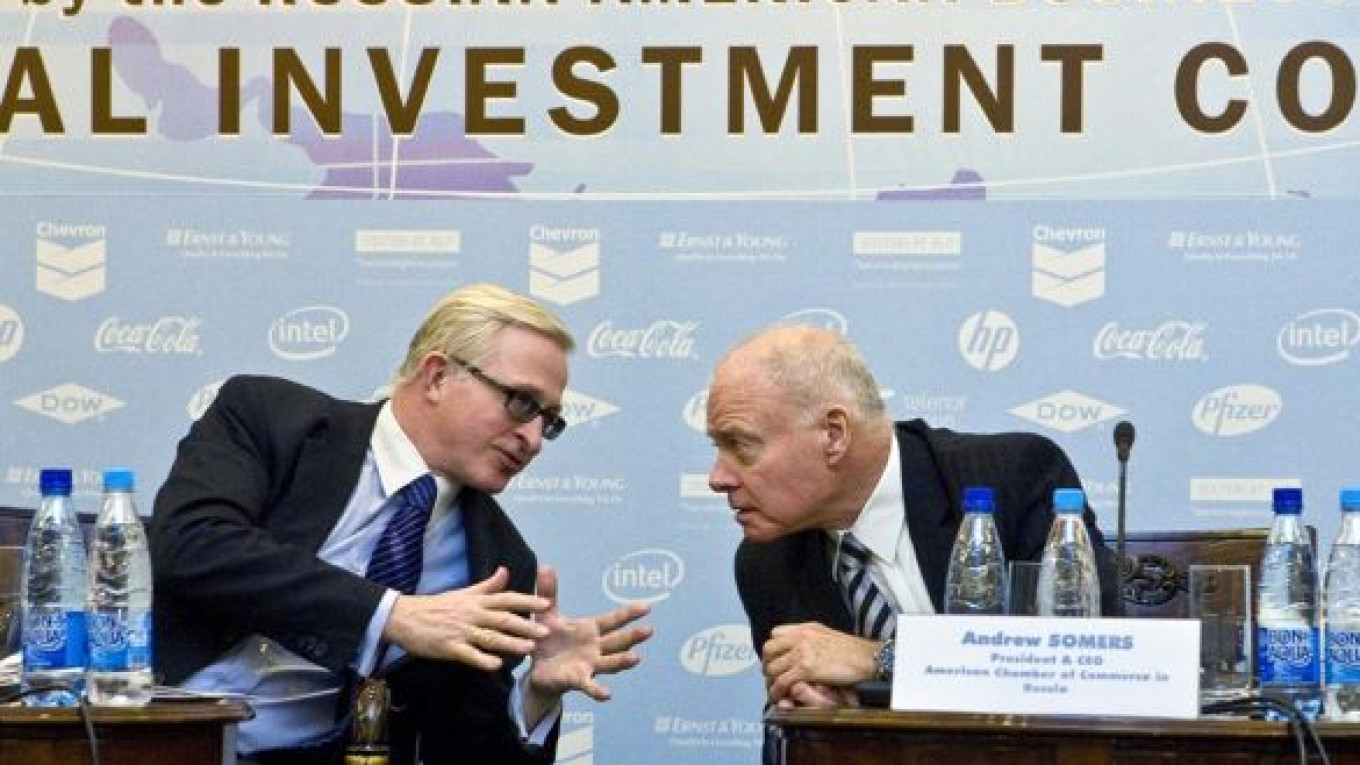Russia is sending the "wrong signal" to foreign investors by introducing "exasperating" registration procedures for expatriates at a time when the country is trying to lure more professionals from abroad, the American Chamber of Commerce said.
Companies lost the right to register foreign employees with the Interior Ministry on Feb. 15, when new rules came into force stipulating that only the owner of a property where a foreigner lives can perform the task. Registration and de-registration are required every time a person enters or leaves the country, travels to another Russian city or renews a visa.
The change has created legal chaos for thousands of workers and companies at a time when President Dmitry Medvedev and Prime Minister Vladimir Putin are encouraging highly skilled labor to come and help modernize the country, said Andrew Somers, head of AmCham in Moscow. It may also increase the "financial pressure" on foreign companies and workers, said the Association of European Businesses in Russia.
"It's an irritant and the wrong signal to send at the very time they're inviting foreign professionals to come," said Somers, who lobbies on behalf of more than 700 foreign and domestic companies.
Medvedev, 45, has vowed to ease visa requirements and other administrative barriers for foreign professionals as he seeks to diversify the economy away from natural resources and turn Moscow into a global financial center.
"Russia has to become an attractive country where people from all over the world will strive in search of their special dream," Medvedev told investors in St. Petersburg last June.
The rule changes have created "considerable difficulties" that will likely push up rental rates because many apartment owners won't be willing to submit the rental contracts and other documents needed to register a foreign tenant, the Association of European Businesses said in a statement.
Somers said he held meetings with officials from the Economic Development Ministry and the Federal Migration Service late last week in an effort to amend the law so companies can continue to handle the registration process for their foreign employees. Some draft amendments may be ready as early as next week, Somers said.
The Federal Migration Service, a part of the Interior Ministry, will work with companies until the situation is resolved with clarity and won't take punitive measures for violations during the transition, Konstantin Poltoranin, a spokesman for the service, said by phone from Moscow on Friday.
The service has registered about 3,000 foreign workers under its new "highly skilled" program, which is aimed at easing the bureaucratic burden for the kind of laborers the government is seeking to attract, he said.
"To us it was like a fly in the ointment," Poltoranin said. "We understand there are large numbers of people coming from the former Soviet Union and there is a problem with their registration. Unfortunately, the changes backfired against law-abiding Western investors."
AmCham is recommending that its members continue to register their foreign employees as before, only now using their home address rather than their work address until the government amends the rules again, Somers said.
It's an informal "compromise," Somers said.
A Message from The Moscow Times:
Dear readers,
We are facing unprecedented challenges. Russia's Prosecutor General's Office has designated The Moscow Times as an "undesirable" organization, criminalizing our work and putting our staff at risk of prosecution. This follows our earlier unjust labeling as a "foreign agent."
These actions are direct attempts to silence independent journalism in Russia. The authorities claim our work "discredits the decisions of the Russian leadership." We see things differently: we strive to provide accurate, unbiased reporting on Russia.
We, the journalists of The Moscow Times, refuse to be silenced. But to continue our work, we need your help.
Your support, no matter how small, makes a world of difference. If you can, please support us monthly starting from just $2. It's quick to set up, and every contribution makes a significant impact.
By supporting The Moscow Times, you're defending open, independent journalism in the face of repression. Thank you for standing with us.
Remind me later.


